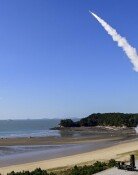[Opinion] Fall in Washington
![[Opinion] Fall in Washington](https://dimg.donga.com/egc/CDB/ENGLISH/Article/20/01/10/27/2001102769758.jpg)
The name `Potomac` of Potomac River which runs through Viriginia, Maryland, and the capitol of Washington D.C. means `love` in one Native American language. This `River of Love` runs from the Appalachian to the Atlantic Ocean, spanning 600 km. The colored leaves on the Potomac River banks dizzy the eyes with their brilliant hues. The mood of the city, however, is different from the usual Fall air.
The roads in the front and behind of the White House have been blocked off. The police stand guard in various posts and look around vigilantly. The Capitol and the Smithsonian which are usually run over by tourists and students on field trips stand nearly empty. The Pentagon on the other side of the river still wears the scars from the September 11 attack. One part of the building has collapsed like a crushed automobile. The repair costs are estimated to be around 8 million dollars.
The troubles that the U.S. face seem to be getting worse with the coming of Fall. There is also much fear about the anthrax virus, to the point that President George W. Bush had to announce on TV, ``I do not have anthrax.`` On top of this, there are concerns over new biological weapons. President Bush`s words about fighting the war on two fronts come to mind. The death toll in Afghanistan is also a cause for worry. There is greater possibility that the American Special Forces may suffer casualties while the suffering of the Afghan refugees provoke anti-war sentiments.
Strengthening the worldwide alliance against terrorism also does not seem to be as easy as it appeared. After the First World War, the U.S. focused its energies on forming an international alliance. The intention was to create an international defense organization that would prevent wars and in which no free-riding or neutral nations would exist. Yet, the proposal did not pass the Senate, and the U.S. itself could not enter the international alliance. Eighty years later today, the U.S. is promoting another kind of international defense organization. It is different from the Cold War alliance where similar minded nations got together to maintain a balance of power. It is a war against terrorism in which the entire world would participate. Yet, the globalized world`s response is not the same as it was in the beginning. Nations who want to opt out are beginning to surface.
In this situation, how does North Korea look right now to the U.S.? At the conference on U.S.-Korea relations organized by the Kyungnam Institute for Far Eastern Studies, news media, and Georgetown University on October 24, American speakers argued that North Korea must cooperate with the U.S. at the present time. Jack Pritchard, Special Assistant to the President on Asian Affairs said, ``The U.S. is open. This is a golden opportunity. Do something,`` and urged North Korea to cooperate. It was an order to provide any available intelligence connected to the terrorists. Otherwise, North Korea will be cast out again from the international rank and file.
Why is North Korea hesitating to make a clear stand? It may feel contempt for the U.S. who regards North Korea as a rogue state or perhaps it is unclear about the state of world affairs and does not know the right course of action. Whatever the case may be, North Korea is not in a situation where it can divulge all of its past. It will have to reveal the Yodo kidnappers and disclose details of weapon deals with Middle Eastern and African nations on the black market. North Korea`s sense of pride will not allow them to make such disclosures. Even if they do provide the information, there is no guarantee that they will get off scot-free. North Korea may be worried that it will be pushed further into a corner. It has already announced to the outside world through a formal statement that it denounces the terrorists. May be that is the limit for North Korea.
Can the U.S. take the initiative in improving the relation like a true superpower nation instead of just making demands? It is a logical contradiction to call North Korea a rogue nation and then demand that it participate in an anti-terrorist campaign. First, the U.S. should remove North Korea from the list of rogue states and see if that makes the situation easier.
It is already a year since the head of the North Korean People`s Army, Cho Myung-Nok visited the White House in uniform and U.S. Secretary of State, Madeline Albright visited Pyongyang and met North Korean leader, Kim Jung-Il to discuss U.S.-North Korea relations. The current state of that relation is completely opposite of what it was back then. The war on terrorism may be deepening the chasm between North Korea and the U.S. They must find Solomon`s wisdom before the situation gets worse.
Nam Chan-Soon (Editorial Staff)
Nam Chan-Soon chansoon@donga.com







